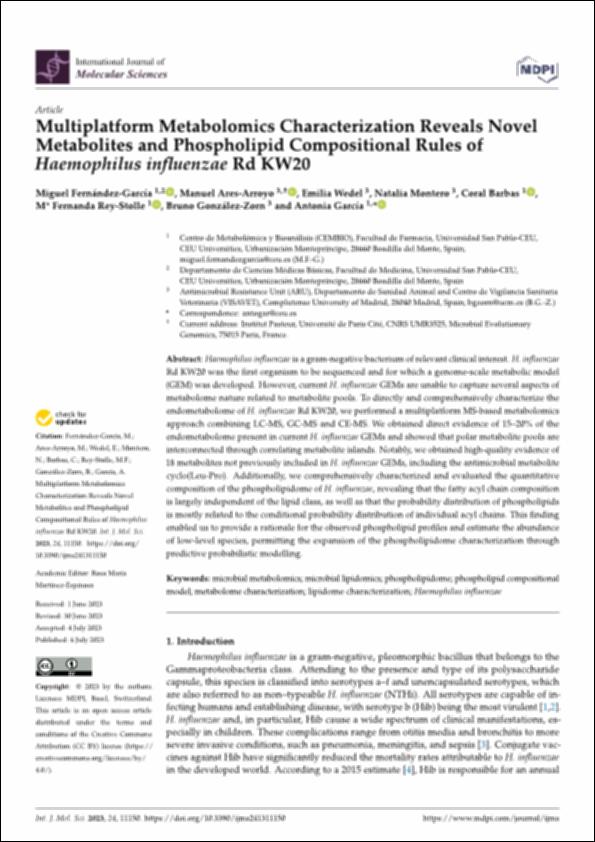Por favor, use este identificador para citar o enlazar este ítem:
http://hdl.handle.net/10637/15427Multiplatform Metabolomics Characterization Reveals Novel Metabolites and Phospholipid Compositional Rules of Haemophilus influenzae Rd KW20
| Título : | Multiplatform Metabolomics Characterization Reveals Novel Metabolites and Phospholipid Compositional Rules of Haemophilus influenzae Rd KW20 |
| Autor : | Fernández García, Miguel Ares-Arroyo, Manuel Wedel, Emilia Montero, Natalia Barbas Arribas, Coral. Rey-Stolle, María Fernanda González Zorn, Bruno García Fernández, Antonia |
| Materias: | Haemophilus influenzae; Lipidome characterization; Metabolome characterization; Microbial lipidomics; Microbial metabolomics; Phospholipid compositional model; Phospholipidome |
| Editorial : | MDPI |
| Citación : | Fernández-García M, Ares-Arroyo M, Wedel E, Montero N, Barbas C, Rey-Stolle MF, González-Zorn B, García A. Multiplatform Metabolomics Characterization Reveals Novel Metabolites and Phospholipid Compositional Rules of Haemophilus influenzae Rd KW20. Int J Mol Sci. 2023 Jul 6;24(13):11150. doi: 10.3390/ijms241311150. PMID: 37446331; PMCID: PMC10342370. |
| Resumen : | Haemophilus influenzae is a gram-negative bacterium of relevant clinical interest. H. influenzae Rd KW20 was the first organism to be sequenced and for which a genome-scale metabolic model (GEM) was developed. However, current H. influenzae GEMs are unable to capture several aspects of metabolome nature related to metabolite pools. To directly and comprehensively characterize the endometabolome of H. influenzae Rd KW20, we performed a multiplatform MS-based metabolomics approach combining LC-MS, GC-MS and CE-MS. We obtained direct evidence of 15-20% of the endometabolome present in current H. influenzae GEMs and showed that polar metabolite pools are interconnected through correlating metabolite islands. Notably, we obtained high-quality evidence of 18 metabolites not previously included in H. influenzae GEMs, including the antimicrobial metabolite cyclo(Leu-Pro). Additionally, we comprehensively characterized and evaluated the quantitative composition of the phospholipidome of H. influenzae, revealing that the fatty acyl chain composition is largely independent of the lipid class, as well as that the probability distribution of phospholipids is mostly related to the conditional probability distribution of individual acyl chains. This finding enabled us to provide a rationale for the observed phospholipid profiles and estimate the abundance of low-level species, permitting the expansion of the phospholipidome characterization through predictive probabilistic modelling. |
| URI : | http://hdl.handle.net/10637/15427 |
| Derechos: | http://creativecommons.org/licenses/by-nc-nd/4.0/deed.es |
| ISSN : | 1422-0067 |
| Fecha de publicación : | 6-jul-2023 |
| Centro : | Universidad San Pablo-CEU |
| Aparece en las colecciones: | Medicina |
Los ítems de DSpace están protegidos por copyright, con todos los derechos reservados, a menos que se indique lo contrario.


